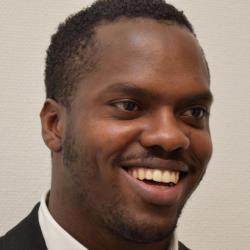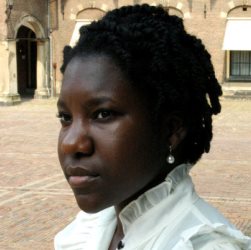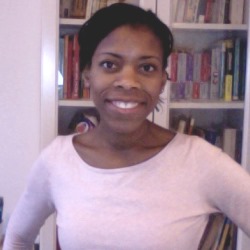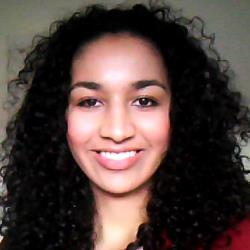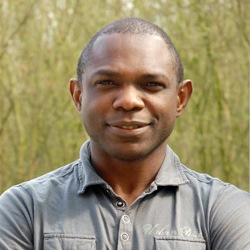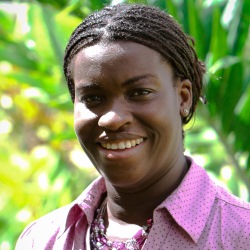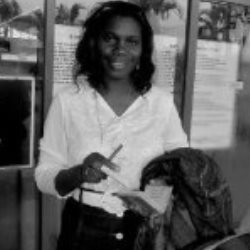2023
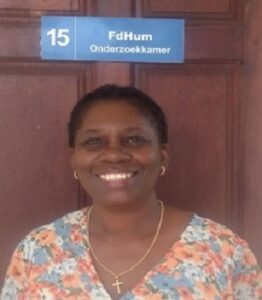
Martina Amoksi
Kawina Ndyuka and Pamaka Maroon Historical and Contemporary use of Traditional Territory
This study will assess the 18th-20th century socio-economic development of Kawina Ndyuka and Pamaka Maroons (two of Suriname’s six groups) in eastern Suriname. The research will determine the drivers for historic period migratory and settlement choices of the enslaved Africans that escaped plantations in the Tempati Creek and Upper Commewijne river and their subsequent migration to the Marowijne river and Tapanahoni river. According to oral historical accounts, three ancestral settlements were reported to have been established in Tempati Creek (White 2018). The clustered settlements in question are: Poitiede, Beekawe and Kondee. The contemporary habitation of both the Pamaka and the Kawina Maroons are proximal to these Tempati Creek ancestral settlements.
This study will also assess how their contemporary habitation in their traditional territory is affected by the expansion and development policies of the large-scale mining sector. Since the eighteenth century this region has experienced routine natural resource exploitation driving migration and settlement within the area. The Tempati Creek region is of current interest to the large-scale gold mining sector where both the Pamaka and Kawina Ndyuka Maroons are considered proximal “host communities” to which the extractive industry is beholden. This study is timely because Maroons are also deliberating with the government of Suriname about the right to land and decision-making power about development in their traditional territory. This data may help offset the lack of evidence about Kawina Ndyuka and Pamaka Maroon historical and contemporary use of what they define as their traditional territory.
Martina Amoksi studied history at the Institute for the Training of Teachers (IOL) in Suriname where she obtained her MO-B diploma. She is a full- time lecturer at the Anton the Kom University of Suriname. She received her PhD from the Vrije Universiteit Amsterdam (VU) in September 2023. In 2009 she completed her master’s degree in history at the University of Amsterdam (UvA) in 2009. Her book was published in 2009; The maroon women in the city: A historical analysis of the impact of urbanization on maroon women in Suriname in the NiNsee/Amrit series. From 2007 to 2012 she worked as a researcher at the National Archives of Suriname
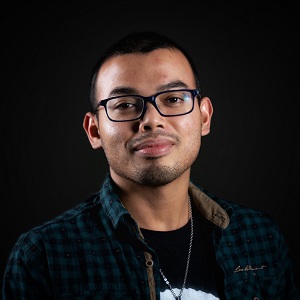
Jonathan Tjien Fooh
Kita Kene: Uncovering the Process of Healing from Historical Trauma among the Javanese Community in Suriname
2023 marked the year to commemorate the abolition of Slavery in Suriname and the ABCSSS islands; on the 9th of August 2023 we commemorated 133 years of Javanese Emigration in Suriname, but this received far less attention. Furthermore, there has been increasing research on the lasting impacts of colonization and historical oppression, through the lens of ‘historical trauma’, with the focus on the holocaust and ongoing oppression Indigenous people still face in the present. Some research efforts have concentrated on the intergenerational impact of slavery, resulting in theories like post-traumatic slave syndrome. Research on Indentured Labour, however, has been comparatively limited, and on Javanese-Surinamese people even more so. This research aims to uncover the impact of colonialism and historical trauma from the perspective of the Javanese community in Suriname and shed light on their process of healing, combining ethnography, imagination, archival research and storytelling. As artistic, cultural and spiritual practices gave Javanese people a sense of rootedness and resilience in the colonial era, I aim to explore how the Javanese-Surinamese community today applies these elements as a means of healing. This research also seeks to approach trauma and healing from a decolonial perspective, challenging dominant paradigms that split healing in the binaries of ‘western’ and ‘traditional’, often portraying ‘western’ medicine as superior.
Jonathan Tjien Fooh is a poet, writer, and researcher from Suriname, currently residing in the Netherlands. He studied Psychology (BSc.) at Anton de Kom University of Suriname and Cultural Anthropology (MSc.) at Utrecht University. All of his work is rooted in untangling systems of exclusion and oppression using an intersectional and decolonial lens; ultimately breathing life to untold and erased (hi)stories. His previous research explored themes related to the meaning of rukun and wellbeing in the lives of Javanese women in Suriname, arts-based research, queerness, identity, migration, and the politics of belonging. In 2015 he published the children’s book ‘De Magische Tuin van Mbah Semie’ (The Magical Garden of Grandma Semie), inspired by Javanese-Suriname culture and mythology. He also worked as a writer and translator on the oral history project ‘Geheugen van Noord Commewijne’ (Memory of Noord Commewijne). Currently he is a part of the research team of ‘Re/Presenting Europe: Healing the Afterlives of Colonialism’ and works as a coaching lecturer at Athena Institute (Vrije Universiteit Amsterdam).
2022
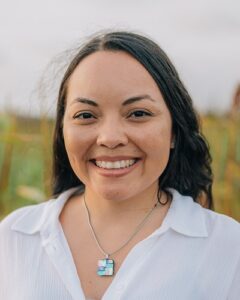
Margyene Booi
Kralendijk: Protection of built heritage in a growing city center
In recent years the island of Bonaire has gone through a rapid development in different areas. One of them being construction on the island. The luster of Bonaire being a tranquil island is disappearing to the dismay of many inhabitants and visitors. In the past decades owners have been selling their historical family homes and land to investors and/or tearing them down in order to make room for apartment complexes and modern homes. This has put extra pressure on the built heritage and historical infrastructure of the island, especially within the city center of Kralendijk, historically known as De Rheede. It is currently a protected townscape consisting of many historical buildings and infrastructure. However, the lack of knowledge and education on the value and stories about this heritage, their existence is still threatened. The first part of this research is focused on that which existed and how the city functioned 100 years ago. This will be put into perspective with that which still exists today. The second part of the research focuses on creating an interactive 3D-model to bring awareness to a much broader public. This can be used for educational and further research purposes.
Margyene Booi was born on Bonaire and studied in the Netherlands. She studied Architectural Design & Engineering (BSc.) at The Hague University of Applied Sciences and Architectural History & Preservation of Monuments (MA) at the University of Utrecht. Her master thesis was focused on the development and 3D reconstruction of the demolished Rijksmunt in Utrecht’s city center dating back to the 15th century. She has recently started –BonaireMonuments– in order to tell the stories behind the built heritage of Bonaire of both the demolished buildings as well as existing ones. She also took part in the Talent Ontwikkel Programma Bonaire where she worked in a project team to set up a self-guided historical walking tour –Ecitytourbonaire– through the historical part of Kralendijk.
Reconstructions:
https://skfb.ly/6VSLF
https://skfb.ly/6TOwL
https://skfb.ly/6TOwI
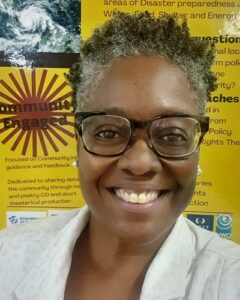
Lysanne Charles
When Island(er)s le(a)d: From exploitation to jollification to (re)imagination. An ethnographic exploration of the interaction between local knowledges and practices and the water, food, shelter, energy nexus on policy preparation and execution during and the hurricane season.
Lysanne Charles’s PhD research will employ a transdisciplinary approach to analyze and bring together stakeholders from government and the community in order to create a dynamic, viable policy and strategy roadmap for the islands of St. Maarten, Saba and St. Eustatius. She has eagerly begun with the research of this project and looks forward to working with a broad network of stakeholders across the SSS islands.
Lysanne Charles is a second year PhD candidate with the Island(er)s at the Helm Project and has a background in Sociology, Cultural Anthropology, Political Science and Mass Communications. She is an educator, activist, and artist. Her work and interests have focused primarily on the empowerment of marginalized groups. In the past she also worked as a civil servant in the areas of policy development and implementation. Her interest in climate change and climate justice intensified after the passing of Hurricanes Irma and Maria and during the Covid-19 lockdown on the SSS islands, when it became apparent that the development of sustainable food and shelter strategies were necessary in order to not make marginalized groups even more vulnerable.
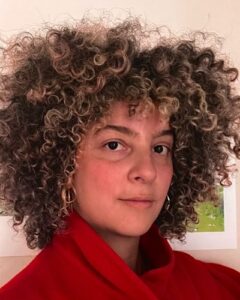
Ichmarah Kock
Queer spaces in Aruba: Continuations and disruptions of ‘Jimmy’s Place’
Jimmy’s Place has been known as a famous gay bar in Aruba during the early 2000s — a space where queer people in Aruba could go to and develop a sense of community, which could create a sense of security and relatability. However, how much do we know about history of queer communities in Aruba? The current state of knowledge on queer history in Aruba is scarce or overlooked— academic investigations are yet to be explored. In this predoctoral research, I will investigate the existence of different physical public queer spaces in Aruba from a historical perspective when Jimmy’s Place became locally known as ‘Aruba’s gay bar’ until its closure. This research seeks to initiate a historical documentation on the existence of queer people in Aruba within a specific timeframe. By knowing the historical ways queer people in Aruba utilised public (or private) spaces, the societal relevance of this research is to show the queer community within a historical context. It answers the question that queer spaces are not new and have always existed in Aruba.
Ichmarah (uses pronouns she/they) is from Aruba, a community organizer, an illustrator, and has an academic background in Art and Architectural History. As a co-founder of 6 ISLANDS zine, Ichmarah has been co-organizing events centering shared experiences of ABCSSS communities (Aruba, Bonaire, Curaçao, Saba, St. Eustatius, and St. Maarten). Ichmarah is also co-founder of Ban Topa Artist Meetup Aruba. This initiative aims to create (digital) spaces for visual artists within the community of Aruba, where they can draw together, visit exhibitions, and talk about topics related to their artistic practices. Ichmarah is also co-organizer of Queer Dreams, a yearly party in the Netherlands that aims to celebrate the full and intersecting identities of Caribbean queer community members.
2021

Joandi Hartendorp
Slavery and Holocaust education: A social imaginaries approach highlighting multi-directionality
My PhD focuses on what has been canonised through history education about Dutch slavery and Holocaust history in the Netherlands and the reasons for this specific canonisation. I compare these two histories because, based on preliminary interviews, it became clear that perpetration is nuanced and externalised, and victims and descendants of victims are ‘othered’ through stereotypical and racist language in both history education practices. I use the multi-directional memory (Rothberg, 2009) approach and the concept of social imaginaries (Taylor, 2004; Alma, 2015) to give depth to the analysis of Dutch slavery and Holocaust education and to demonstrate the dialogical and selective nature of both memory cultures. Furthermore, through my research I aim to create awareness with history teachers about the nuance, externalisation and ‘othering’ that underlie their teaching practices to inspire them to apply more inclusive methods.
Joandi Hartendorp was born in Haiti and brought up in the Netherlands. She is currently completing her PhD thesis at the University of Humanistic studies in which she combines her interests in Dutch perpetrator history and inclusive education.
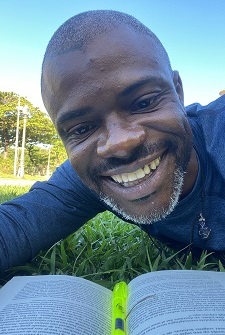
Miguel E. Keerveld
Inclusion and plurality in multilingual and multicultural Suriname
Alakondre-fasi is known as performing ambiguity in Suriname. This model of identification is contextualized through artistic research as framework for creative production. This is performed in relation to art therapy, to explore social relations based on cultural diversity. To investigate Suriname’s historical relation with the Netherlands, the project ‘ALAKONDRE: A Space in Time’ sees alakondre-fasi as entanglement of counseling and curatorial producing. This case study takes place at the Amsterdam University of the Arts and relates to alternative forms of staging art in the context of Suriname. Simultaneously, the research explores visual culture as non-discursive discourse related to cultural diversity. Based on the diverse cultural aspects of Suriname, a model of versatility is of importance for translation in the local multilingual and multicultural composition. The study combines traditional and modern approaches, connecting a plurality of ancestral knowledge systems through contemporary art; e.g., conversations based on artistic presentations and reflections of these art manifestations. In pursuit of a discourse on the role and functioning of ‘identity’, alakondre-fasi also provides temporal spatiality for the individual and the communal to confront memories of trauma and taboo. While exploring care within socio-political and cultural context, this study investigates performative gestures that entangle the past, the present and the future as event that symbolically disassembles space of power to reassemble space of strength. As a way of artistic research, staging is used to translate questions about diversity, inclusion, and identification in Suriname.
Miguel E. Keerveld (Suriname, 1982) has staged over 20 manifestations and interventions. To challenge ideas of colonization and representation, he intersects activism, social practice, artistic research, and creative production. While participating in artistic research at the Amsterdam University of the Arts (The Netherlands), Miguel is also curator-in-residence at Readytex Art Gallery in Paramaribo (Suriname). He has participated in several residencies in Latin America and have won different prizes and mentions.
2020
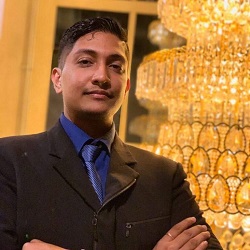
Santosh Singh
Plantation Esthersrust: Deciphering silent waters
Plantation Esthersrust was a 19th Century cotton plantation located at the confluence of the Warappa Canal and the Atlantic Ocean in Commewijne, Suriname, South-America. Plantation Esthersrust is Suriname’s only exposed cotton plantation with a rich history indicative of its shared heritage linking Suriname and the Netherlands. For years this plantation was submerged under the sea, but due to the 30-year cycle lies exposed during low tide. Esthersrust holds special importance to Suriname because it’s an opportunity to learn about the spatial layout of cotton plantations and a space that serves as a memory of a specific period in Surinamese history. It also tells a very rich story of the plantations as they were built and managed in Suriname. It tells the story of an emerging industry, slavery and the struggle with and the use of water. Because this site holds much importance and information about a specific period in time (especially the cotton era, which very little is known of) it is of prime importance to help protect this site. I will make an attempt to determine the exact boundaries of plantation Esthersrust. This will be done to highlight the breadth of the plantation system, and the role of maritime archaeology to explain settlement and land use of settlers, the enslaved and Indigenous peoples alike. This project also proposes to produce a short documentary of the site in order to create awareness around heritage protection in Suriname, using Plantation Esthersrust as a basis.
Santosh Singh was born and raised in Suriname, South America. He recently attained his Master’s Degree in Archaeology from Leiden University based in the Netherlands. He first came in contact with archaeology in Suriname at the Anton de Kom University of Suriname, where he did his Bachelor’s in History with a minor in Archaeology. Singh is currently doing an internship at the Archaeological Services of Suriname, where he will research both Plantation Esthersrust and Fort Sommelsdijk in detail. Furthermore, he will also produce 4-6 documentaries on archaeology and heritage in Suriname, to help create awareness on its value and why they should be valued.
Watch the short documentary about Plantation Esthersrust, made by Santosh.

Ine Apapoe
Governance of traditional societies: The character and quality of traditional, modern and dual authority in Suriname
The research about the quality of dual governance in Suriname is in line with the discussion about the role traditional societies could or should play in governance, whether or not in cooperation with the state to develop their residential areas. The study focuses more specific on the role of good governance and related public values that are important in the governance of Ndyuka society by traditional and the modern state governance, in the logging, gold mining and education sector. Therefore, this study answers the question of what role good governance plays in a dual governance structure, a theme which has gain very little attention in the scientific literature so far.
Ine Apapoe is a public administrator/ lecturer and head of the Public Administration Department (Policy & government) of the Department in the Faculty of Social Sciences at the Anton de Kom University of Suriname. During her career she has worked on several research projects in the field of (local) governance, traditional governance and livelihood, land rights issues, gender and gender mainstreaming. One of her focus areas is good governance and public values. Currently Ine is finishing her dissertation about the role of good governance in dual governance structures in Suriname, at the Vrije Universiteit of Amsterdam, the Netherlands.
2019
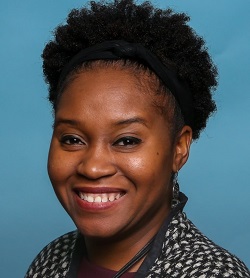
Nihayra Leona
A Curaçaoan longitudinal study on the effectivity of a Papiamentu-English and Dutch-English bilingual education program
How effective are Curaçaoan bilingual secondary school programs in promoting students Papiamentu, Dutch and English language development? Western countries have embraced bilingual programs in primary and secondary education, but implementation and maintenance of these programs have been problematic in non-western low and middle income countries (e.g. Erling, Adinolfi & Hultgren, 2017; Simpson, 2017). Since August 2018 Curaçaoan students can be enrolled in a Papiamentu-English or Dutch-English bilingual (CLIL) program in several schools for higher levels of secondary education. In this three-year longitudinal study the Papiamentu, Dutch and English vocabulary and reading comprehension development of the students in these two bilingual programs is compared to the performance of students in traditional Dutch-immersion programs. After taking into account some child-internal and child-external factors we will be able to conclude whether and for what kind of students the two bilingual programs are effective in promoting students’ language development.
Nihayra Leona was born and brought up on Curaçao. She has a Research Master’s Degree (Cum Laude) in Psychology, and is currently a PhD candidate at the University of Amsterdam. For her doctoral research, she investigates the English language development of early English language learners (9-12 years) in The Netherlands. Her research focuses on the contribution of individual factors like (native) language competence, cognitive skills, motivation and extramural exposure to English to English language skills. Nihayra’s research interests include among others language development and scholastic performance of children having a different mother tongue than the instruction language in school and the acquisition of additional languages (like English) by bilinguals and multilinguals. Since Spring of 2018 she has been investigating the Papiamentu, Dutch and English language development of students in bilingual (Papiamentu-English and Dutch-English) secondary education on Curaçao. Nihayra is also the chairwoman of Levende Talen Papiaments.
Antilliaans Dagblad, ‘2-Talige scholing scoort‘, juni 2021.
2018

Keisha Wiel
Language ideologies, education, and social media: Socialization practices in education and language attitudes on facebook
Through the relationship of language ideology, identity, and education, I will investigate how attitudes about language, that are seen Facebook, are taught to students in the classroom and its effects on identity formation in a formal educational setting in Aruba and Curaçao. There are still notions that Papiamentu, in contrast to Dutch, is not suitable as a language of instruction because it hinders students’ access to universities. Debates over such matters are now seen in online forums, particularly on public Facebook pages where people strongly express their opinions about language issues and access to education. As scholars (Coleman 2010) have suggested that digital spaces have become central places for debates about nationhood, human rights, and activism, I will employ both qualitive and quantitative methods from linguistic anthropology to understand the construction of identity through ideologies of language. This project asks: how are issues of language, identity, and policy intertwined and maintained through education in a multilingual postcolonial society? This research will help to facilitate insights into the intersection between ideologies of language, identity, and education.
Keisha Wiel was born and raised in New York to an Aruban mother and a Curaçaoan father. She is currently a PhD student in Anthropology at Temple University with a concentration in Linguistic Anthropology. Her research interests primarily focus on the socialization of language ideologies in education and how those ideologies are presented and performed on social media. Specifically, she researches how children are socialized into ideologies about Papiamento/u and Dutch in secondary education in Aruba and Curaçao and in turn observes how those ideologies get discussed, debated, and practiced on Facebook. Through this, she will examine how notions of identity are informed by these ideologies about language on the islands.
2017

Mitchell Esajas
Black, Dutch & radical: Exploring the politics of black Dutch radicals
Documents and articles found in the Black Archives suggest that there is a longer history of black radical movements, intelectuals and organizers than. Much research has been done on black radical movements, organizers in the Anglophone world but relatively little research has been done about black radicals in the Dutch context. Based on archival research I aim to gain more insight in the position and relation between Dutch radical intellectuals and organizers and their Caribbean counterparts with a focus on Otto Huiswoud.
Mitchell Esajas (1988) is co-founder and chairman of New Urban Collective and The Black Archives in Amsterdam, a unique collection of books, documents and artefacts documenting the history of black people and black resistance in the Dutch context. He studied Business Studies and Social and Cultural Anthropology at the Vrije Universiteit Amsterdam.
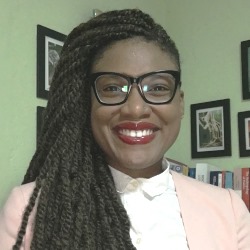
Aisha Leer
The missing link; Women’s role in the revolt of ‘Trinta di Mei 1969′
The research ‘The missing link; Women’s role in the revolt of ‘Trinta di Mei 1969’ focuses on the involvement of women in the revolt of May 30th 1969 on the Dutch Caribbean island of Curaçao. This revolt was instrumental in the development of the Curaçao that we know today, but the involvement of women has never been deeply researched. The goal of this research is to collect narratives of women who have participated both directly as indirectly in the events previous, during and after the May 30th revolt. The end results will be presented in a book that focuses on the narratives of these women.
Aisha Leer was born and raised in Curaçao and graduated in 2015 with a master degree in Cultural Anthropology and Development Sociology at the University of Leiden. Her master thesis focused on the ways female migrants in the Netherlands from the Dutch Caribbean perceived the creation of the ‘ideal body’. She has since continued to work on issues concerning Caribbean women. Currently she works as an independent researcher and lecturer at the University of Curaçao.
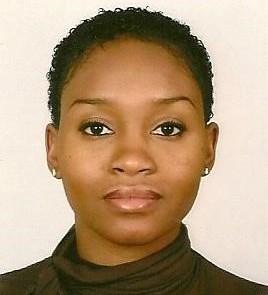
Nihayra Leona
Het Engels én het Papiaments; Een exceptioneel Caribisch geval van tweetalig onderwijs in het hoger secundair onderwijs
In augustus 2018 opent op Curaçao de eerste havo/vwo school die het Engels én het Papiaments als instructietaal hanteert. Deze nieuwe onderwijsvorm wijkt sterk af van de status quo: immersie in de voormalige koloniale taal, het Nederlands. Creoolse talen worden zelden als officiële instructietaal ingezet in het hoger secundair onderwijs. Dit terwijl tweetalig onderwijs, dat gebruik maakt van de moedertaal van de meerderheidskinderen, effectief kan zijn voor de ontwikkeling van zowel de moedertaal als een tweede taal. In dit onderzoek wordt de taalvaardigheid van de leerlingen voor aanvang van de school en na één jaar tweetalig onderwijs onderzocht.
Nihayra Leona is geboren en getogen op Curaçao. Toen zij 18 jaar was, migreerde zij naar Nederland om haar studie voort te zetten. Zij heeft de research master psychology aan de Universiteit van Amsterdam afgerond en is momenteel bezig met haar promotieonderzoe ‘Oral and written English language learning’ (ORWELL). Nihayra is tevens voorzitter van de Sectie Papiaments van Levende Talen en redactielid van het Levende Talen Magazine.
2016
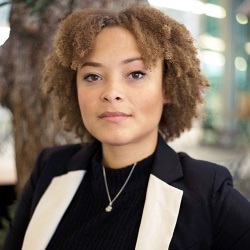
Emilie van Heydoorn
“And we neglected the mind” (Clemencia 1999); The reproduction of coloniality in learning and teaching practices in primary education on Curacao
This research addresses the issues of the primary education system, which is proved to be insufficient and inadequate in preparing the majority of students for a successful completion of their education, (Clemencia 1999, 11). Education plays an essential role in the social and economic development of the Island of Curacao. In this case it is crucial that the primary education system prepares and stimulates students to be conscious citizens who critically engage with their environment, community and themselves.
The aim of this research project is to explore the ways in which coloniality is reproduced or interrupted in learning and teaching practices in primary education on Curacao. Two different primary schools with two student groups between the ages of eight and ten will be analyzed by looking at how colonial legacies play a role in classrooms. This project focuses on the behavior of teachers, their interaction with students, the behavior of students and the curricular materials used in teaching. By implementing the frameworks of decoloniality and intersectionality this research aims at contributing empirical data and theoretical insights to a larger discussion regarding the role of education in discourses of identity formations.
Emilie van Heydoorn was raised on the Island of Curacao and at a young age moved to the Netherlands where she completed her studies. At the University of Utrecht she obtained a MA degree in Media and Culture Studies and is currently completing a RMA in Gender & Ethnicity. This research will be conducted as part of her RMA thesis and will function as preliminary research in preparation for doctoral research. She has taught in the Department of Media and Culture Studies, in the Gender Studies Minor at UU. As a research assistant she was involved in the Diversity Commission at the University of Amsterdam. Her research interests focus education, (de-)coloniality and decolonial feminism.
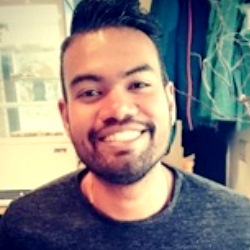
Durwin Lynch
Embracing ‘Brua’; A first step towards facilitating meaningful and effective collaboration between western health professionals and traditional healers.
Brua is an Afro-Caribbean religion and healing tradition practiced on Aruba, Bonaire and Curacao that exists for more than 350 years, and which plays a significant role in how (local) individuals make sense of their health and wellbeing. While western/biomedical approaches to health are dominant in some settings, there is an increasing amount of literature showing that people may use different explanatory models to attribute the cause of deviations in health (both mentally and physically) to supernatural occurrences or to previous wrongdoings, and seek relief through rituals and practices performed by traditional healers. The aim of this exploratory study is to contribute to a (better) collaboration between Western health professionals and Traditional Healers, by gaining a more in-depth understanding of how Brua is perceived and practiced nowadays by the inhabitants of Curacao. The study takes a constructive perspective on the practice of Brua, approaching it as a cultural phenomenon, and seeking to define its influence on the lives of people using their own framing and interpretation. The main research question that guides this research is “How does the traditional healing act of Brua manifest itself in Curacao society compared to western medicine, and what are the enabling and hindering factors to their co-existence?” The study takes a qualitative, ethnographic approach involving document analysis, semi-structured and explorative in-depth interviews, as well as participatory observations.
Durwin Lynch originates from exotic Surinam and has lived 15 years on the beautiful island of Curacao, before pursuing his studies in the Netherlands. He has a bachelor degree in Science and Innovation Management (Utrecht University) and a Master degree in Management, Policy-analysis and Entrepreneurship in Health and Life Sciences (VU-University, Amsterdam), with a specialization in International Public Health. He is currently completing his PhD project ‘The role of citizens in sustainability transitions’ at the VU-University in Amsterdam, and is involved in a variety of health and sustainability related courses. With diverse interests in public health, sustainability, inclusion, cultural anthropology and education he feels that he is a proud ‘Yu di Korsou’ that would like to build a bridge between his personal and academic background.
2015
Julian Isenia
Biba of Laga Biba/ Live and let live?; Exploring same-sex intimacies and the ‘Global Queer’ through artistic and cultural praxis on Curaçao
This preliminary research and fieldwork project seeks to gain an in-depth knowledge of ‘queer’ subjects and lives of the Dutch Caribbean community, and of the way in which these confirm, disrupt, reiterate, reject, or maintain the logic of what is often posited as a ‘global queerness’. The proposed field work involves collecting source materials related to a number of case studies in the areas of film, literature, theatre and cultural performance, combining immersive participatory observation, in-depth interviews, focus group discussions and cultural performance analysis, as well as archival research on the island of Curacao.
It is a first, but significant, step in preparation for a broader doctoral research to observe the tension between queer representations and the notion of decolonization in the Dutch Antilles, and how cultural and artistic practices on the islands serve to reflect critically on this relationship. It references recent developments in LGBT rights on the Dutch Caribbean islands and contributes to a much-needed critical examination of same-sex discourses in the Dutch Caribbean.
Wigbertson Julian Isenia originates from the Island of Curacao and has an MA degree in Arts and Culture (University of Amsterdam), and two bachelor’s, in interdisciplinary social sciences (University of Utrecht) and Theatre Studies (University of Amsterdam).
Joseph Jordan
Fugitive heuristics; Comparative marronage and problems of historical representation
His dissertation project, tentatively titled “Fugitive Heuristics: Comparative Marronage and Problems of Historical Representation,” investigates a series of antagonistic representations of marronage in the Western Hemisphere. Rather than producing a history (or histories) of marronage—national or otherwise—his project uses public representations of marronage to investigate and problematize the disciplines which take maroons as object of study: history, anthropology, literature, and political science. Thus his research is as much concerned with the production of knowledge about maroons, as it is with public understandings of what practices of marronage signify in the modern world when they are invoked in contemporary situations. The study of literary production by maroons, and about maroons is key for this study.
The generous research grant from the Dr. Silvia W. de Groot Fonds will permit Joseph to conduct archival research in Suriname (Nationaal Archief Suriname) and Jamaica (Jamaica Records and Archives Department) on public commemorations and material culture pertaining to maroons in both respective countries.
Joseph Jordan is PhD student in the Department of English at Vanderbilt University. His research interests include—but are not limited to—racial slavery; cultural memory; theories of race, gender and the political; Black intellectual history; British Cultural Studies; and speculative fiction. Prior to his current doctoral study at Vanderbilt University, he respectively obtained degrees in Postcolonial Studies and African American Studies at Goldsmiths College, University of London and Northwestern University at the master’s level. Joseph D. Jordan is of Afro-Surinamese descent, and was born and raised in Amsterdam, the Netherlands.
Daphina Misiedjan
Building bridges over vulnerable waters; Defining a sustainable human right to water for both the present ‘vulnerable’ and future generations. A case study of Suriname
Daphina Misiedjan is a PhD candidate at the Utrecht Centre for Water, Oceans and Sustainability Law and is associated with The Netherlands Institute of Human Rights. She specializes in issues concerning human rights in relation to environmental issues. Daphina obtained her LL.M. in legal research from Utrecht University in 2013 where she also obtained her Bachelor. During her studies she was able to conduct research in New-Zealand, Curacao, Suriname and the Netherlands. In 2014, she published two articles about her research on the human right to water for indigenous communities. And in 2015 she published about her research on access to drinking water in Yemen.
Her PhD research also focusses on the human right to water but includes the realization of sustainability goals and access for vulnerable groups. Suriname will serve as a case-study. Daphina Misiedjan takes a legal perspective to Surinamese water management and analysis how law can contribute to realizing sustainability goals in water management while guaranteeing access to water for all.
Daphina also received the Silvia de Groot grant in 2014. She defended her PhD thesis Towards a sustainable human right to water at Utrecht University on 3 November 2017.
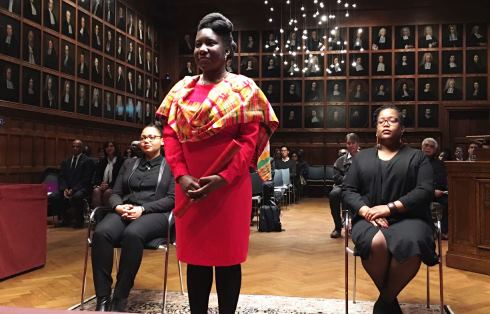
Contact: [email protected]
2014
Daphina Misiedjan
Bruggen bouwen over kwetsbare wateren; Het definiëren van een duurzaam mensenrecht op water voor zowel kwetsbare groepen als toekomstige generaties
Daphina Misiedjan is promovenda aan de Universiteit Utrecht, verbonden aanhet Utrecht Centre for Water, Oceans and Sustainability Law en het Studie- en Informatiecentrum Mensenrechten (SIM). Ze is gespecialiseerd in mensenrechten in relatie tot duurzaamheid en (zoet)water. Daphina heeft haar Master in rechtswetenschappelijk onderzoek behaald in 2013 aan de Universiteit Utrecht waar zij ook haar Bachelor behaalde. Tijdens haar studie heeft zij onderzoek kunnen uitvoeren in Nieuw-Zeeland, Curaçao, Suriname en Nederland. In 2014 publiceerde zij over het recht op water van inheemse groepen.
Het gehonoreerde onderzoek focust ook op het mensenrecht op water maar kijkt hierbij naar het realiseren van duurzaamheidsdoelstellingen en toegang voor kwetsbare groepen, waarbij Suriname als als case-study dient. Daphina Misiedjan kijkt vanuit juridisch perspectief naar het Surinaamse waterbeheer en analyseert hoe wetgeving kan bijdragen aan het bereiken van duurzaamheid in waterbeheer en hoe toegang voor iedereen gewaarborgd kan worden.
2013
Guiselle Starink-Martha
Mobility, national identity and the politics of black aesthetics in the Dutch Caribbean; The case of the new Caribbean nation of Curaçao
Het gehonoreerde project van Guiselle Starink-Martha is een eerste stap naar een groter onderzoek naar de samenhang tussen esthetiek en zwarte identiteit in het Caribisch gebied. Starink-Martha gaat onderzoek doen naar visuele representatiesvan ‘zwartheid’ in zowel culturele producten als in het dagelijkse leven. Dit vooronderzoek richt zich specifiek op esthetische constructies van zwartheid binnen het fenomeen ‘natuurlijk haar’ op Curaçao. Hoe wordt Afro-Curaçaos ‘natuurlijk haar’ beleefd en vormgegeven in het dagelijks leven en hoe gaan Curaçaoënaars om met ‘kroeshaar’? Hoe wordt het uitgebeeld in de media en populaire cultuur? Hoe verhoudt dit zich tot de constructie van een Curaçaose nationale identiteit in het algemeen en tot een Afro-Curaçaose identiteit in het bijzonder? Hoe verhoudt deze Afro-Curaçaose beeldvorming zich tot de heropleving van de ‘natural hair scene’ binnen de mondiale Afro-diaspora?
In het Caribisch gebied zijn de huidige processen van natievorming en collectieve identiteitsconstructie, die gekenmerkt worden door zowel racialisering als post-kolonialisme, niet los te zien van bredere processen van globalisering. Door huidige Curaçaose debatten over ras, kleur en identiteit te koppelen aan visuele representaties en esthetiek, zoekt dit onderzoek nieuwe manieren om te denken over ras en post-kolonialisme in het geglobaliseerde Caribisch gebied van de 21ste eeuw.
Guiselle Starink-Martha is op Curaçao geboren en getogen. Zij heeft Talen en Culturen van Latijns- Amerika aan de Universiteit van Leiden gestudeerd. Zij is als promovenda verbonden aan de Radboud Universiteit Nijmegen. Haar promotieonderzoek betreft constructies van collectieve Curaçaose identiteit onder transnationale Curaçaoënaars door middel van muzikale performances. Haar onderzoek richt zich op hedendaagse populaire cultuur en huidige belevingen en constructies van identiteit. Zij is vooral geïnteresseerd in de verhouding tussen critical theory en alledaagse beeldvorming en gewoontes.
Wendeline Flores
De Antilliaanse en Surinaamse studentenbeweging (1950-1975)
Het onderzoek van Wendeline Flores, ondersteund door het Silvia W. de Groot Fonds, richt zich op de Antilliaanse en Surinaamse studentenbewegingen tussen 1950 en 1975. Het wordt verricht in het kader van haar masterscriptie en dient tevens ter voorbereiding van diverse toekomstige publicaties en vervolgonderzoek. De vraag wat de positie van de Antilliaanse en Surinaamse student immigranten in de naoorlogse, (post)koloniale samenleving (1950-1975) was en hoe zij de positie van zichzelf en hun ‘landgenoten’ trachten te veranderen, staat hierbij centraal.
Het onderzoek richt zich op de actieve deelnemers, leiders en oprichters van Antilliaanse en Surinaamse studentenverenigingen enstudentenbladen in Nederland. Zij zijn de belangrijkste bronnen en zullen in Nederland, Curaçao, Aruba en Suriname geïnterviewd worden. Dit zal verder worden aangevuld met relevante archiefstukken.
Het onderzoek is bedoeld om een geschiedenis vast te leggen die vooralsnog onvoldoende aandacht heeft gekregen. De documentatie van de ervaringen van de hoofdrolspelers uit de beide bewegingen is hierbij van essentieel belang en is door middel van de genereuze subsidie van het Silvia W. de Groot Fonds mogelijk gemaakt.
Wendeline Flores (1989) is studente Geschiedenis MA aan de Vrije Universiteit van Amsterdam. Gedurende haar studie heeft zij onderzoek gedaan naar de geschiedenis van Curaçao, het geboorteland van haar vader, maar ook naar het Caribische gebied in bredere zin. Ze heeft stage gelopen bij het Tropenmuseum en daar onderzoek gedaan naar de Suriname collectie. Tevens heeft ze stage gelopen bij het Nationaal Instituut Nederlands Slavernij Verleden en Erfenis, waar zij ook als vrijwilligster actief is geweest. Wendeline Flores schreef haar bachelorscriptie over het Antilliaanse studentenblad ‘Kambio. Portabos Independiente Antiano’ (1965-1968) en haar redactie. Op basis van archiefonderzoek in Nederland en interviews met de voormalige redactieleden in Nederland en Curaçao is de geschiedenis van ‘Kambio’ in kaart gebracht. Thema’s die in haar onderzoek centraal staan zijn o.a. (post)kolonialisme, ras en slavernij.
Jenna Marshall
Decolonising through education? Caribbean radical politics of development; A study of education in Barbados
Jenna is a second year PhD candidate in the School of Politics and International Relations, Queen Mary University of London. With an MRes from the School, she also holds a bilingual Honours degree from York University (Canada). Her recent work includes Assistant Curator of the Making Freedom Project in partnership with the Windrush Foundation, UK Royal Geographical Society and the Marcus Garvey Library. Additionally, she has undertaken the role of Teaching Assistant for the first-year undergraduate module ‘Introduction to International Relations’.
A researcher by training, she has worked on areas related to economic and social development within Latin America and the Caribbean. Prior to joining the School, Jenna has held posts which include Research Fellow for the Barbados Coalition for Service Industries, Print Media Journalist and Correspondent with the United Nations Development Programme.
Her overall research interests seek to explore the impact of global civil, political and economic actors and their relations within the developmental process of small island developing states, with particular reference to the Caribbean. Successfully obtaining a Special Award from the Ministry of Education and Human Resource Development in Barbados, her current research seeks to locate education as part of a broader radical political project in the developmental process in nation- building period after constitutional independence in Barbados. She aims to identify and analyse the various political and economic actors within informed the politics of development particular in the area of education as conceptualised as a key driver of both social and economic development opposed to other variants of development approaches employed in the Caribbean region.
2012
Vinije Haabo
Onderzoek naar lexicale verschillen tussen de Saramakaanse dialecten
Vinije Haabo verricht reeds jaren, voornamelijk met eigen middelen, linguïstisch onderzoek naar de Saramakaanse taal. Dit resulteerde onder meer in het concept voor een woordenboek van het Saramakaans dat hij beoogt open access op het internet te publiceren. Zijn werk wordt hogelijk gewaardeerd door prominente wetenschappers, waaronder de antropoloog Richard Price en de taalkundige Maarten Mous. Haabo heeft ondersteuning van het fonds gevraagd om zijn onderzoek te verdiepen door verder veldwerk te verrichten in Suriname, Frans-Guyana en Nederland. Het bestuur van het fonds was unaniem van mening dat deze kandidaat en deze aanvraag bij uitstek in aanmerking komen voor ondersteuning door het Dr. Silvia W. de Grootfonds.
Vinije Haabo (1971) is van Saramakaanse afkomst. Hij volgde zijn schoolopleiding in Suriname, deels in het binnenland, deels in Paramaribo, waar hij ook een landbouwopleiding volgde aan de Universiteit van Suriname. Vanaf 1999 werkte en studeerde hij in Nederland, thans als freelance schrijver, journalist en onderzoeker.
2011
Ine Apapoe
Het bestuur van traditioneel Ndyuka samenleving. Nieuwe elementen?
Het gehonoreerde project maakt deel uit van een promotieonderzoek dat zich richt op de relatie tussen de Surinaamse overheid en het Ndyuka traditioneel bestuur en/ of daarbij sprake is van ‘goed besturen’. Dit specifieke deel van het onderzoek richt zich op de invloed van de huidige ontwikkelingen binnen de Ndyuka samenleving in Suriname, Nederland en Frans Guyana op het functioneren van het traditioneel bestuur. Nagegaan wordt wie de nieuwe spelers zijn binnen het traditionele Ndyuka bestuur en welke rol ze spelen. Duidelijk is dat de Ndyuka samenleving verandert en het voorgenomen onderzoek heeft ten doel om na te gaan wat deze veranderingen betekenen voor het Ndyuka traditioneel bestuur en de betekenis daarvan voor Ndyuka samenleving.
Ine Apapoe is bestuurskundige en als docent verbonden aan de studierichting Bestuurskunde van de Anton de Kom universiteit van Suriname. Ine heeft meegewerkt aan verschillende onderzoeksprojecten voornamelijk in het binnenland van Suriname. Momenteel is zij, naast docent, bezig met een promotietraject aan de Vrije Universiteit van Amsterdam.
Publicatie mede mogelijk gemaakt door het Silvia de Groot Fonds: ‘Governing Nydyuka society abroad; The council of Kabiten and Basiya of Okanisi in the Netherlands‘. Dit artikel verscheen in het boek Legacy of slavery and indentured labour: Historical and contemporary issues in Suriname and the Caribbean.
Martina Amoksi
De stad kwam naar het binnenland
Dit promotieonderzoek richt zich op de sociale, economische en culturele processen, die het dagelijks leven van de Ndjukavrouwen in het Cotticagebiedhebben beïnvloed, na de vestiging van de Suralco op Moengo (1916). Nagegaan wordt hoe deze groep inspeelde op de veranderingen en welke betekenis deze had voor de natievorming in Suriname. Het doel van het onderzoek is om door middel van een geschiedkundige beschrijving en analyse van de invloed die uitging van het bauxietstadje, meer inzicht te verschaffen in de impact die dit heeft gehad op de Marronvrouwen in het gebied. Essentieel binnen de wetenschappelijke benadering is dat het onderzoek uitgaat van een expliciete genderbenadering.
Martina Amoksi is historica, docente geschiedenis en medewerker van het Nationaal Archief Suriname. Zij publiceerde in 2009 de Marronvrouw in de stad: een historische analyse van de gevolgen van de urbanisatie voor de Marronvrouwen in Suriname (Amsterdam/Den Haag: NiNsee/Amrit). Momenteel is zij werkzaam als docente geschiedenis en als onderzoeker bij het Nationaal Archief Suriname.
May Ling Thio
JPF op Curaçao: een Surinaams (t)huis elders. (Post-) koloniale migrantenverenigingen en de strategische waarde van de meervoudige etnische identiteit van hun leden
Het onderzoek richt zich op het vastleggen van de verhalen van (oud-)leden van de Surinaamse vereniging JPF op Curaçao (opgericht in 1941) om inzicht te verkrijgen in de rol van een dergelijke organisatie op het positioneringsproces van haar leden.
Het unieke van deze casus is dat de informanten als (post-)koloniale migranten naar een ander koloniaal Rijksgebied zijn verhuisd en (mede daarmee) een bijzondere vorm van meervoudige etnische identificatie in zich bergen. Ter (re-) constructie van deze geschiedenis, zullen persoonlijke interviews worden afgenomen, en kan er ook worden geput uit zowel persoonlijke als verenigingsarchieven.
Afgestudeerd als organisatie-antropoloog aan de Vrije Universiteit Amsterdam, is May Ling Thio vooral geïnteresseerd in het spreken mèt betrokkenen, in plaats van óver hen. Geboren in Indonesië, met Chinese voorouders, maar opgegroeid op Curaçao, heeft ze ook een persoonlijke betrokkenheid bij haar onderzoeksveld. Meervoudige etnische identiteit en identificatie, migrantenverenigingen en sociale netwerken vormen de leidraad in haar onderzoeksinteresses.




